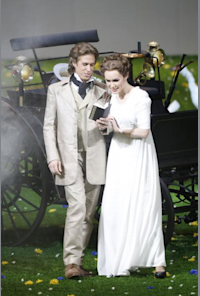“Opera Onegin will never be a success, I know this in advance. I will never find artists who can meet even approximately my requirements. The treasury, the routine of our scenes, the nonsense of the production, the system of keeping the disabled, not giving way to the young - all this makes my opera almost impossible on the stage ... Yes, this opera is devoid of a future!
It is difficult for a modern viewer to imagine that a year before the premiere, Pyotr Ilyich Tchaikovsky was so lamenting, thinking about the future fate of his creation. The idea to write an opera based on the "encyclopedia of Russian life" by Alexander Sergeevich Pushkin was suggested to the composer by Elizaveta Lavrovskaya, a singer and teacher at the Moscow Conservatory. Tchaikovsky wrote the opera quickly: a little more than six months passed from the emergence of the idea (May-June 1877) to its implementation (the work was completed on February 1, 1878).
In the autumn of 1877, Tchaikovsky sent a letter to the founder of the Moscow Conservatory, Nikolai Rubinstein, asking him to watch the first act of the “lyrical scenes” and think about staging it with the help of students: “Staging it at the Conservatory is my best dream. It is designed for modest means and a small stage. Moreover, in one of his letters to the teacher Karl Albrecht, Tchaikovsky wrote: “I did not give Onegin away for any benefit of either the St. Petersburg or Moscow directorate, and if she is not destined to go to the Conservatory, then she will not go anywhere.” Levenson, a columnist for Russkiye Vedomosti, wrote shortly after the premiere, which took place at the conservatory on March 17, 1879, according to Art. style: "The work of Mr. Tchaikovsky <...> will probably become one of the most popular pieces of our operatic repertoire, thanks to the national plot and charming music."
Probably, Tchaikovsky felt that luck would not smile at his opera on the government stage: the premiere at the Bolshoi Theater (January 11, 1881) was received rather coolly by the audience and critics. Nevertheless, until the end of the 19th century alone, one hundred and fifty-four performances were given.
In the 20th century, Boris Pokrovsky's performance, staged in 1944 together with conductor Alexander Melik-Pashaev and set designer Peter Williams, became the absolute record holder in the number of shows. In this performance, created under the influence of the legendary production of Konstantin Sergeevich Stanislavsky, many of the most famous singers of the Bolshoi Theater performed: Galina Vishnevskaya and Tamara Milashkina, Makvala Kasrashvili and Galina Kalinina (Tatiana), Panteleimon Nortsov and Pavel Lisitsian, Yuri Mazurok and Yuri Gulyaev (Onegin) , Sergey Lemeshev and Ivan Kozlovsky, Anton Grigoriev and Vladimir Atlantov (Lensky), Alexander Pirogov and Mark Reizen, Alexander Ognivtsev and Evgeny Nesterenko (Gremin).
A landmark performance of the 21st century was Eugene Onegin staged by maestro Alexander Vedernikov and director Dmitry Chernyakov. “Even not every dramatic performance leaves such a feeling of volume, semantic fullness, psychological accuracy in relationships, in creating an atmosphere (here - the life of the estate and the capital). And the feeling that all this is subtracted from the text, not invented, but extracted, in demand, finally. And surprise, as it was not noticed before, that passing, situational, divertissement episodes: everything is action, everything is events, everything is drama. (Elena Tretyakova, Petersburg Theater Journal).
The fifteenth production in the history of the Bolshoi Theater was performed by conductor Tugan Sokhiev, director Yevgeny Aryeh, who at that time was already familiar to the Bolshoi audience from the successful production of Weinberg's opera The Idiot, and set designer Semyon Pastukh.
Yevgeny Arie, not striving to modernize the story literally and not trying to squeeze it into some specially composed concept, saw his main task in making the opera sound fresh.
According to him, it was very important for him and Semyon Pastukh that this story begins in the village. On the stage there is a huge, huge meadow, stretching into an endless distance, which also symbolizes the boundless Russian expanses. And hens and geese roam this meadow... They wanted the village world to be “warm” – after all, it was terribly loved by both Pushkin and Tchaikovsky. Besides, this is Tatiana's world. The world of fairy tales that the nanny told her, like Pushkin - Arina Rodionovna. Therefore, the idea came that the same geese, a goat and especially a bear (it is not for nothing that he appears to her in a dream) can become part of her world.
Gremin's ball takes the viewer to a completely different space. This is a strange world, a little unreal, a little "frozen". And the people who inhabit it are special, not very "mobile" ... Nevertheless, all of them are still living people ...







